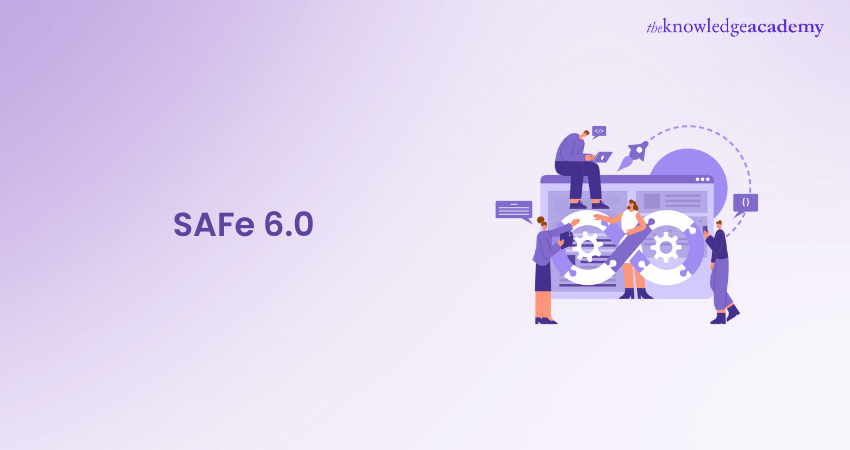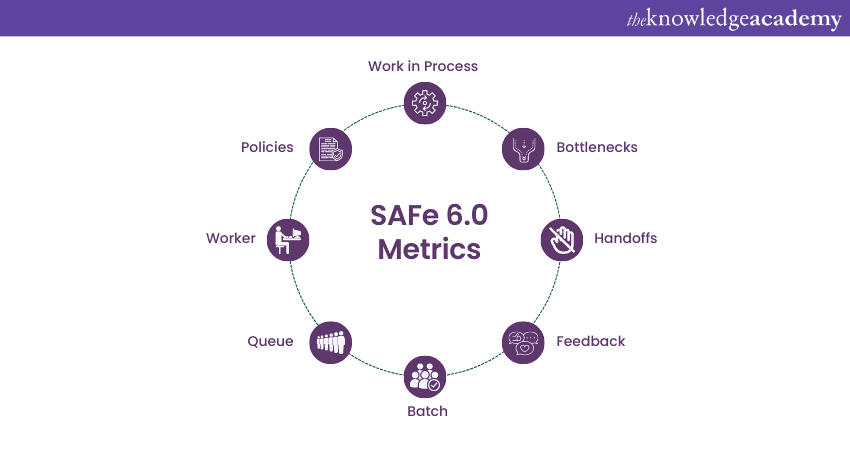We may not have the course you’re looking for. If you enquire or give us a call on +43 720 115337 and speak to our training experts, we may still be able to help with your training requirements.
Training Outcomes Within Your Budget!
We ensure quality, budget-alignment, and timely delivery by our expert instructors.

The Scaled Agile Framework (SAFe) stands as a leading project management approach, embraced globally for its adaptability and dynamic enhancements. Have you wondered why organisations worldwide choose SAFe? Or how the latest iteration, SAFe 6.0, launched on March 15, 2023, advances the methodology further?
Reflecting on the KPMG Global Agile Survey from 2019, an impressive 81% of participants embarked on their Agile journey within the last three fiscal years. The survey highlighted SAFe’s iterative and systematic structure as a key factor in their successful Agile adoption.
In this blog, we’ll delve into the updates introduced in SAFe 6.0. We’ll explore how these changes can propel business agility and the flow of value across organisations on a global scale. So, let’s dive in!
Table of Contents
1) What’s new in SAFE 6.0?
a) Emphasis on Business Agility
b) New Lean Portfolio Management
c) Significance of DevOps and Agile product delivery
d) Improved ART and PI planning
e) Improved SAFe metrics
f) New Lean-Agile leadership competency
g) SAFe Business Agility assessment
h) Delivering efficiency with Big Data, AI and Cloud
2) Why Should you Complete the SAFe 6.0 Upgrade?
3) How to Complete the SAFe 6.0 Upgrade?
4) Conclusion
What’s new in SAFe 6.0?
Scaled Agile Framework (SAFe) has integrated several changes in its framework to keep up with the demands and pace of the modern world. The changes are as follows:
1) Emphasis on Business Agility
The SAFe 6.0 framework emphasises Business Agility, which refers to an organisation's ability to respond promptly and efficiently to customer needs and market changes. It focuses on creating a lean enterprise that can adapt to changing business conditions by:
a) Delivering value faster
b) Improving the customer experience
c) Reducing waste
The fundamental aspects of Business Agility have been substantially improved by including the concepts of Business Agility Value Streams (BAVs) and articles of foundation.

2) New Lean Portfolio Management
The Leading SAFe 6.0 framework introduces a new Lean Portfolio Management (LPM) function that helps organisations align their strategy, investment, and execution. LPM provides a way to balance the organisation’s strategic priorities, allocate resources effectively, and measure the results. The new LPM function streamlines the process, reduces bureaucracy, and enables Agile decision making.
The Core Values of LPM have also been updated as:
a) Alignment
b) Transparency
c) Respect for people
d) Relentless improvement
3) Significance of DevOps and Agile Product Delivery
Leading SAFe 6.0 emphasises DevOps and Agile product delivery to enhance the effectiveness and efficiency of software development and delivery. The framework encourages Continuous Integration and Continuous Delivery (CI/CD) practices, which helps teams deliver software faster and with higher quality. Additionally, the latest iteration of SAFe provides more guidance on integrating Agile and DevOps practices for continuous delivery and deployment.
Unlock new opportunities in Agile and get your Safe Agile Interview Questions and stay ahead!
4) Improved ART and PI Planning
SAFe 6.0 includes improvements to the Agile Release Train (ART) and Program Increment (PI) planning processes. Before discussing the changes in ART and PI, it is pivotal to know what these two crucial terms mean:
a) ART: Agile Release Train (ART) is a self-organised team of Agile Teams in the product development process that are bound by the same Vision and Roadmap. Generally, an ART consists of 5-12 teams that plan and execute the product together and act as the primary construct for value delivery.
b) PI: Program Increment (PI) is a period of 8-12 weeks in a SAFe environment. It consists of a series of iterations within a schedule that defines the work to be completed by multiple teams on the same product. While the concept is similar to that of a Sprint, a PI is scaled for larger organisations with more detailed and multi-faceted teams.
The new ART and PI planning processes are designed to be more collaborative and flexible, enabling teams to execute their work more effectively.
5) Improved SAFe Metrics
Leading SAFe 6.0 includes new and improved metrics that help organisations measure their performance and progress. The metrics are designed to provide insights into the effectiveness of the SAFe implementation, identify areas for improvement, and help teams continuously improve their processes and practices.
SAFe 6.0 includes new and improved metrics that help organisations measure their performance and progress. The metrics are designed to provide insights into the effectiveness of the SAFe implementation, identify areas for improvement, and help teams continuously improve their processes and practices.
These new metrics are part of the development flow of the product, and are listed as follows:
a) Work In Process
b) Bottlenecks
c) Handoffs
d) Feedback
e) Batch
f) Queue
g) Worker
h) Policies
6) New Lean-Agile Leadership Competency
SAFe 6.0 introduces a new Lean-Agile leadership competency, which focuses on developing leaders who can effectively guide and support Agile teams in an organisation. The competency includes a set of skills and behaviours that are essential for Agile leaders, including coaching, facilitating and leading change.
7) SAFe Business Agility Assessment
SAFe 6.0 introduces a new Business Agility assessment that helps organisations evaluate their level of Business Agility. The assessment provides a framework for evaluating an organisation’s ability to respond to market changes, deliver value faster, and improve customer satisfaction.
Additionally, the latest iteration of SAFe includes expanded guidance on the application of Objectives and Key Results (OKRs), which can help organisations enable more profitability. OKRs help in setting up a Roadmap and Vision for the organisation’s teams for the development and deployment of products.
Register for our Certified SAFe® For Teams course and learn how to implement the SAFe framework in your Agile projects!
8) Delivering Efficiency With Big Data, AI and Cloud
SAFe 6.0 aims to deliver efficiency through the use of fourth-generation technologies such as AI, Big Data, and Cloud. The integration of these key technologies into business processes will become critical for the effectiveness of organisations in the future.
AI: Artificial Intelligence (AI) can influence the business models and operational efficiency of organisations. The creation of an effective model can enhance the chances of quickly and effectively delivering the final product.
Big Data: Big Data can help improve an organisation’s portfolio by enhancing its vision, governance, investment priorities, and centralisation activities.
Cloud: The use of Cloud in a business process can significantly increase agility and product development speed.
Why Should you Complete the SAFe 6.0 Upgrade?
The Leading SAFe 6.0 upgrade endows you with the capabilities to integrate SAFe 6.0 methodologies into your organisation, With the guidance of SAFe 6.0 and the comprehensive learning tools provided by SAFe® Studio, you have the opportunity to develop the agility and resilience that are vital for triumph in the digital epoch.
Boost your public sector career with our SAFe® for Government Certification - register now!
How to Complete the SAFe 6.0 Upgrade?
This section will assist you in upgrading to SAFe 6.0. You need to follow the given steps:
Step 1: Begin by signing into SAFe® Studio. Upon entry, a notification for the SAFe 6.0 upgrade will be prominently displayed. You may either select the notification or use the provided direct link to access the upgrade interface.
Step 2: Initiating the “Get Started” sequence on the upgrade interface will redirect you to My Learning, indicating the SAFe 6.0 upgrade has been incorporated into your learning agenda. This allows for the flexibility to resume the upgrade process at your convenience.
For a personalised experience, you have the option to choose a language preference for your upgrade. If you desire an alternative to English, navigate to “SAFe 6.0 Upgrade Options” and select your desired language.
Step 3: The upgrade process for certified members is estimated to take approximately one hour and 45 minutes, while SPCs can expect a duration of around two hours. Each module is designed to be completed within 10 to 15 minutes. It includes an amalgamation of text, video content, and mandatory exercises.
The upgrade series is designed for self-directed learning, letting you to progress at your preferred pace. If you opt to tackle one module daily, completion can be achieved within a week, or slightly longer for SPCs, depending on your individual schedule.
To commence, click “Launch” adjacent to the first module title (“Welcome to the SAFe 6.0 Upgrade”), which will open in the current window.
Step 4: Upon finishing all modules, your SAFe 5 certifications will be seamlessly transitioned to SAFe 6.0.
Step 5: Participants who choose to receive digital badges will be awarded SAFe 6.0 badges, suitable for sharing across various digital platforms. Remember to showcase your new badge on LinkedIn, Twitter, or other social networks, and celebrate your accomplishment with the SAFe community by using the hashtag #SAFe6Upgrade.
Conclusion
In conclusion, Safe 6.0 revolutionises the way we approach Agile Methodologies, combining innovation with efficiency to drive unprecedented success. We hope this blog helped you dive into a world where agility meets ingenuity. Embrace this methodolgy and transform your projects with cutting-edge strategies that ensure your team's triumph.
Gain an understanding and certification of the basics of Agile methodologies. Register for our Agile Project Management Foundation (AgilePM) course today!
Frequently Asked Questions

SAFe 6 introduces enhancements and updates compared to SAFe 5. It also refines agile methodologies for improved scalability and efficiency in complex environments.

SAFe 6 for Lean Enterprise extends SAFe principles. It fosters lean-agile transformation throughout the organisation to enhance adaptability and resilience in modern business contexts.

The Knowledge Academy takes global learning to new heights, offering over 30,000 online courses across 490+ locations in 220 countries. This expansive reach ensures accessibility and convenience for learners worldwide.
Alongside our diverse Online Course Catalogue, encompassing 17 major categories, we go the extra mile by providing a plethora of free educational Online Resources like News updates, Blogs, videos, webinars, and interview questions. Tailoring learning experiences further, professionals can maximise value with customisable Course Bundles of TKA.

The Knowledge Academy’s Knowledge Pass, a prepaid voucher, adds another layer of flexibility, allowing course bookings over a 12-month period. Join us on a journey where education knows no bounds.

The Knowledge Academy offers various Agile Trainings, including the Lean Portfolio Management SAFe Training, Certified SAFe For Teams Course, and SAFe DevOps Certification. These courses cater to different skill levels, providing comprehensive insights into the Best Project Scheduling Tools.
Our Project Management Blogs cover a range of topics related to SAFe 6.0, offering valuable resources, best practices, and industry insights. Whether you are a beginner or looking to advance your Project Management skills, The Knowledge Academy's diverse courses and informative blogs have got you covered.
Upcoming Project Management Resources Batches & Dates
Date
 Certified Scaled Agile Framework Leading SAFe® 6.0 Training and Exam
Certified Scaled Agile Framework Leading SAFe® 6.0 Training and Exam
Mon 16th Dec 2024
Sat 21st Dec 2024
Mon 13th Jan 2025
Sat 18th Jan 2025
Sat 22nd Feb 2025
Mon 10th Mar 2025
Sat 22nd Mar 2025
Sat 19th Apr 2025
Sat 17th May 2025
Mon 19th May 2025
Sat 21st Jun 2025
Mon 30th Jun 2025
Sat 19th Jul 2025
Sat 23rd Aug 2025
Mon 25th Aug 2025
Sat 20th Sep 2025
Sat 18th Oct 2025
Sat 22nd Nov 2025
Mon 15th Dec 2025
Sat 20th Dec 2025







 Top Rated Course
Top Rated Course



 If you wish to make any changes to your course, please
If you wish to make any changes to your course, please


